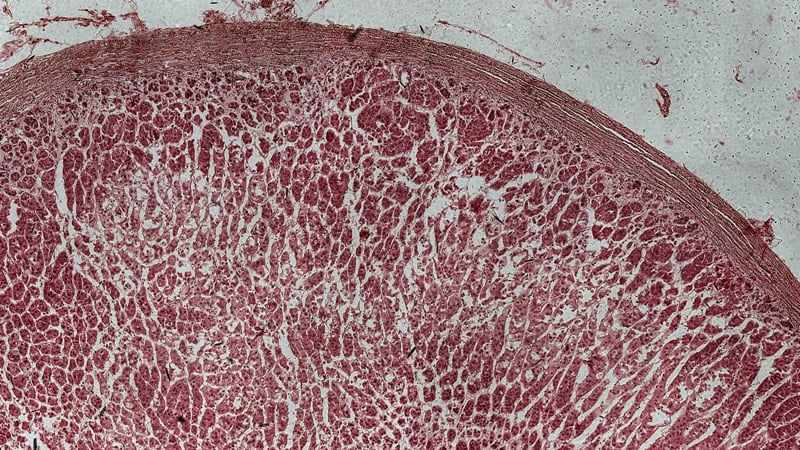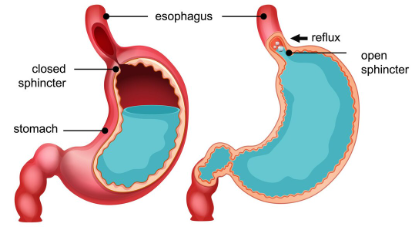Acid Reflux at Night
- Updated on: Nov 16, 2023
- 4 min Read
- Published on Nov 26, 2020

Acid reflux is a condition characterized by stomach acid’s backflow into the esophagus (a tube connecting mouth and stomach). The condition results in various symptoms, including heartburn, chest pain, nausea, indigestion, and shortness of breath. Most predominantly at night, people having acid reflux symptoms are often unable to sleep and develop symptoms like heartburn, indigestion, nausea, and chest pain. Due to all these symptoms, the person may develop sleeping disorders.
Does Acid Reflux Keep You Up at Night-Time?
People with acid reflux disease often feel that their symptoms get worse during the night. Some people wake up in the middle of the night due to regurgitation, coughing, sore throat, and sometimes choking. However, the symptoms depend on how far through the esophagus. The symptoms of acid reflux get worse during the night due to the following reasons:
The stomach acid secretion is usually 2 to 3 times higher at night compared to the day time. As a result, more gastric contractions occur during the night, which ultimately leads to acid reflux.
Most people sleep in an inappropriate position, like lying o the back. In this position, no gravity can hold up the acid in the stomach. Due to lack of gravity, the stomach acid backflows into the esophagus and stays there for some time, which ultimately results in acid reflux symptoms.
Swallowing saliva during the night is important for the acid in the esophagus to go back into the stomach. Some people don’t swallow the saliva, and this causes acid reflux symptoms. The saliva secreted by the mouth contains bicarbonate that plays an important role in the neutralization of stomach acid and changes the esophageal acid’s pH back to normal.
What Could Be the Complications of Acid Reflux at Night?
Some researchers suggest that acid reflux during the night can be a risk for sleep apnea, a condition in which the person suddenly stops breathing while sleeping. The reason behind this is that the backflow of acid from the stomach into the esophagus may cause spasms in the larynx (voice box). This, in turn, prevents the flow of air into the lungs and may ultimately cause breathing problems like sleep apnea. Some of the commonly found complications associated with acid reflux during the night are:
- Obstructive sleep apnea
- Feeling of choking
- Acid aspiration during sleep
- Feeling discomfort
Untreated acid reflux may become a chronic condition and may damage the esophageal tissue damage leading to many complications, such as:
- Barette’s esophagus ( A condition in which the cells of the esophagus looks like the cells of the intestines)
- Esophagitis reflux (Inflammation of the esophagus)
- Esophageal spasms (Contractions in the esophagus)
- Development of ulcers and strictures in the esophagus
How Can You Prevent Acid Reflux at Night?
Various dietary and lifestyle modifications can help reduce the impact of acid reflux on your night sleep. Some of them are mentioned below:
Avoid Eating Before Bed Time
Don’t eat and drink anything three hours before bedtime. The foods that should be especially avoided before going to bed are late-night snacks, late-night dinner, and drinking beverages (coffee, cold drinks, and tea). , therefore eating anything in the late-night hours can be troublesome. Avoiding the habit of late-night eating can reduce the symptoms of acid reflux to a large extent.
Change Your Sleeping Position Towards the Left Side
If you are suffering from acid reflux at night, try to change your sleeping position towards the left side. Sleeping on the left side somehow prevents the relaxation of the LES valve and keeps the stomach acid from back flowing into the esophagus.
Elevate Your Head in Bed
Keeping your head up while sleeping can be useful in preventing the symptoms of acid reflux. You should keep your head at least 6 to 8 inches elevated during sleep to prevent acid reflux. An elevated head maintains the gravity and prevents acid reflux. You can use some pillows or adjustable devices to keep your head elevated while sleeping.
Don’t Consume Foods and Drinks That Can Trigger the Reflux
Certain foods like coffee, tea, spicy food, meat, fish, oily food, milk products, and alcohol may trigger your symptoms of acid reflux. Consider avoiding these foods as they may lead to acid reflux and regurgitation. Instead, prefer foods that can suppress acid production, such as ginger, honey, peppermint, etc.
Avoid Intake of Large Meals
Having large meals can create pressure on your stomach, affecting the LES leading to acid reflux. Avoid taking large meals, especially during the night. Instead, take many short meals. Heavy meals during the night lead to indigestion and heartburn.
Wear Loose Clothes
Wearing tight clothes can create abdominal pressure that may reduce the activity of LES and ultimately result in acid reflux. Therefore use loose-fitting clothes to prevent acid reflux, especially during the night when the acid production is high.
FAQs
Can Acid Reflux Kill You?
No, acid reflux can’t kill you. But, this condition must be taken seriously because it is closely associated with some other serious complications like sleep apnea, barette’s oseophagus, esophageal inflammation and esophageal spasms. If acid reflux is left untreated for a long time it becomes chronic, and may also lead to esophageal cancer.
How to Deal With Acid Reflux at Night?
Acid reflux at night can be reduced, if you follow some measures. These include: Try to avoid eating and drinking just before bed. Shift your sleeping position on left side Don’t take carbohydrate rich food Avoid spicy meals and beverages like tea, coffee and cold drinks. Avoid tight clothes Perform some relaxation exercises
Why Is Acid Reflux Worse at Night?
Acid reflux gets worse during night time due to some specific reasons. The reasons could be too much stomach acid secretion during night time, sleeping in lie down position that makes the acidic content to cause reflux and unable to swallow during sleeping.
Is Milk Good For Acid Reflux?
It is not proved yet that milk can reduce the acid reflux. However, drinking a glass of milk can relieve the heartburn symptoms temporarily. But, this is also true that milk contains fat which can stimulate the acid secretion in the stomach. You can try skimmed milk as it contains less fat and it may not induce acid reflux.












